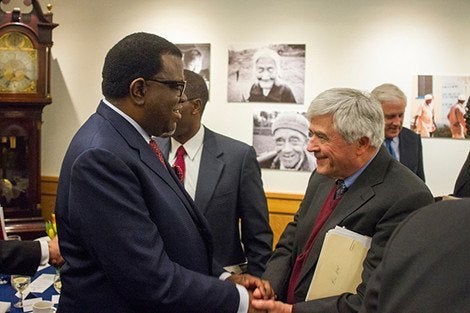March 13, 2014—Like its neighbor Botswana, the Republic of Namibia is considered one of Africa’s success stories. Twenty-four years after gaining independence from South Africa, the sparsely populated nation is experiencing political stability, economic growth, and a dramatic reduction in rates of new adult HIV infections.
Namibian Prime Minister the Right Honorable Hage Geinbob spoke about leadership challenges in Africa at Harvard School of Public Health (HSPH) on March 7, 2014, as part of the Centennial Dean’s Distinguished Lecture series.
In his introduction, Max Essex, Mary Woodard Lasker Professor of Health Sciences, praised Geingob as “an eloquent and effective leader in the Namibian struggle for representation and respect.” A former school teacher turned freedom fighter, Geingob served on the elected assembly responsible for developing the Namibian constitution, which has been described as one of the most liberal and democratic in the world, Essex said. Geingob was elected the country’s first prime minister in 1990, and served for 12 years. He was executive secretary of the Washington, D.C.-based Global Coalition for Africa for several years before returning to service in the Namibian government in 2004.
“New Africa is on the march,” Geingob said in his remarks to the HSPH audience. A key to the continent’s development has been a move to a more “transformational” style of leadership in governments and in the African Union, he said. In the past, African leaders were focused on gaining independence from colonial rule and on keeping the peace. They created change, but it was not managed and came with little thought to what came next, he said.
Transformational leadership requires inclusivity, said Geingob. In Namibia, that means respect for the rights of all Namibians, including the descendants of colonial settlers. “We are one Namibia, one nation,” he said. “Inclusivity spells unity, peace, and development. Whenever you leave out one race or class, you invite war.”
The prime minister spoke with pride about Namibia’s peaceful, democratic elections. As Africa continues developing, countries must put systems in place to keep their electoral processes transparent and accountable, he said.
Namibia also has been praised for its economic management. As business investment and tourism grow in the country, Geingob stressed the importance of ensuring that the benefits do not only flow to a few.
In response to a question, Geingob said that he does not think Namibia or any of the continent’s other new democracies will pass laws criminalizing homosexuality.
“In Namibia, we respect human rights,” he said.
Photo: Michael Mazzanti
